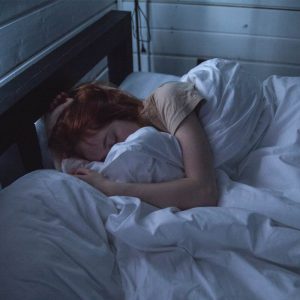 The average adult needs 7 to 9 hours of sleep each night. However, many women are not getting a good night’s rest. Some sleep problems affect women more or differently from men including:
The average adult needs 7 to 9 hours of sleep each night. However, many women are not getting a good night’s rest. Some sleep problems affect women more or differently from men including:
-
-
-
-
- Insomnia – More than 1 in 4 women in the United States experience insomnia, the inability to fall asleep or stay asleep. Insomnia is also more common in people with depression and anxiety, which also affect more women than men.4
-
-
-
- Restless leg syndrome – Restless leg syndrome is more common in women than in men. It can happen to women of all ages but happens most often during pregnancy. Additionally, some medicines used to treat depression can cause restless leg syndrome.
- Sleep apnea – Sleep apnea can be underdiagnosed in women. One of the main signs of sleep apnea is snoring. Women with sleep apnea may be underdiagnosed because they often report more general symptoms such as insomnia, anxiety, and nightmares.
Womenshealth.gov recommends these tips to help improve your sleep:
- Try to go to sleep when you feel sleepy and then get up at the same time each morning.
- Do not drink caffeinated or alcoholic drinks or smoke late in the day or at night.
- Exercise during the day. Exercise or physical activity done too close to bedtime can make it harder to fall asleep. Experts recommend exercising at least 5 or 6 hours before your bedtime, especially if you have insomnia.
- Keep your bedroom dark, quiet, and cool. If light is a problem, try a sleeping mask. If noise is a problem, try earplugs, a fan, or a white noise machine.
- Follow a routine to help relax and unwind before sleep, such as reading a book, listening to music, or taking a bath.
- Do not eat or drink a lot within about 3 hours before bedtime.
- If you cannot sleep within 20 minutes of going to bed or don’t feel drowsy, get out of bed. Read or do a quiet activity until you feel sleepy. Then, try going back to bed.
- Do not do anything in your bed that could make you more awake. Using a mobile phone or laptop, watching TV, or eating in bed can make it harder for you to fall asleep in bed.
- Do not take naps after 3 p.m. if you normally sleep at night.
- Do not look at lighted screens like a laptop or smartphone shortly before bed.
- See your doctor or a sleep specialist if you think that you have a sleep problem
Originally submitted on 05/12/2019
Updated on 11/12/2020
This article is intended to convey general educational information and should not be relied upon as a substitute for professional healthcare advice.
